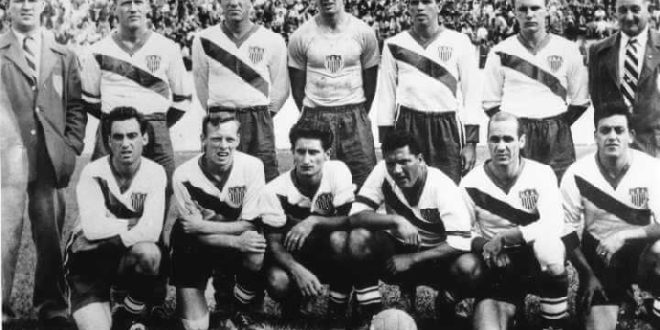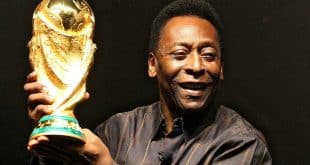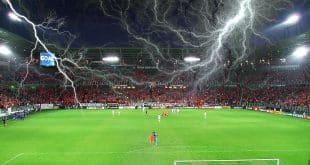Table of Contents
Ever wondered about the epic tales behind the FIFA World Cup’s glorious history? From stunning upsets to jaw-dropping goals, this prestigious tournament has seen it all. Get ready to uncover the captivating journey of how nations battled for soccer supremacy on the world stage. Explore the triumphs, heartbreaks, and unforgettable memories that have shaped this iconic event over the years. Are you ready to relive the magic of past tournaments and discover what makes the FIFA World Cup a global sensation? Join us as we delve into the rich tapestry of victories and defeats that define this unparalleled sporting spectacle.
Key Takeaways
- Understand the evolution of the FIFA World Cup to appreciate its growth and significance over time.
- Recognize milestone events in FIFA history that have shaped the tournament into what it is today.
- Explore the various FIFA World Cup awards to appreciate the individual and team achievements celebrated in the competition.
- Learn about additional FIFA awards and honors that highlight excellence in different aspects of the sport.
- Delve into iconic FIFA World Cup records to grasp the exceptional feats achieved by players and teams throughout the tournament’s history.
- Appreciate the prestige and symbolism of the FIFA World Cup Trophy as a representation of soccer excellence.
Evolution of FIFA World Cup
Pre-World War II Era
The Establishment of FIFA in the early 20th century paved the way for the inaugural World Cup in 1930. Initially, the tournament was limited to European nations, reflecting the sport’s popularity in that region. Uruguay’s historic victory in the first World Cup set a precedent for future editions.
Post-World War II Developments
Following the turmoil of World War II, the World Cup resumed, introducing knockout stages and group matches to intensify competition. This era witnessed the rise of football powerhouses like Brazil and Germany, shaping the tournament’s competitive landscape.
Expansion to 24 Teams
The decision to expand the World Cup to 24 teams aimed to enhance global representation, welcoming more nations from diverse continents. This expansion significantly impacted the tournament’s dynamics, fostering greater competitiveness and diversity on the field.
Expansion to 32 Teams
Further expanding to accommodate 32 teams brought both challenges and benefits. While it allowed more countries to participate, it also posed logistical hurdles. The evolution of group stage formats and knockout rounds transformed the structure of the competition.
Towards a 48-Team Future
Discussions around expanding to 48 teams have sparked debates within the football community. While such an increase could broaden participation, it may dilute the quality of matches. FIFA’s considerations include balancing inclusivity with maintaining the tournament’s prestige.
Milestone Events in FIFA History
2015 Corruption Scandal
The 2015 Corruption Scandal tarnished FIFA’s image, revealing widespread bribery and corruption within the organization. This scandal led to the indictment of top officials and exposed unethical practices.
FIFA’s leadership faced severe consequences, with several high-ranking officials arrested and charged with corruption, including former President Sepp Blatter. The scandal significantly damaged FIFA’s reputation globally, raising concerns about the transparency and integrity of the organization.
To address the crisis, FIFA underwent extensive reforms and implemented stricter governance measures. These changes aimed to enhance transparency, accountability, and ethical standards within the organization. FIFA established new compliance mechanisms to prevent future corruption scandals and restore trust among fans and stakeholders.
Biennial World Cup Debate
The proposal for a Biennial World Cup sparked a heated debate within the football community. Proponents argue that more frequent World Cup events would increase global football engagement, revenue, and opportunities for smaller nations to participate on a larger stage.
Conversely, critics express concerns about player burnout, injury risks, and the impact on domestic leagues and competitions. More frequent World Cups could disrupt club schedules, leading to fatigue among players and potential conflicts between international and club commitments.
The potential shift to a biennial World Cup raises questions about the traditional four-year cycle’s significance and uniqueness. It could alter the dynamics of international football tournaments, affecting player development pathways and competitive balance across regions.
Overview of FIFA World Cup Awards
Golden Ball Award
The Golden Ball award holds immense significance as it recognizes the best player in the FIFA World Cup. The recipient is chosen based on their exceptional performance throughout the tournament. Notable players like Diego Maradona, Ronaldo, and Zinedine Zidane have clinched this prestigious award.
Golden Boot Overview
The Golden Boot award is presented to the top scorer of the FIFA World Cup. In case of a tie, the winner is determined by assists and fewer minutes played. Memorable winners include Thomas Müller, Harry Kane, and Just Fontaine.
Golden Glove Insights
The Golden Glove award acknowledges the best goalkeeper in the tournament. Factors such as clean sheets, crucial saves, and overall performance are considered in selecting the recipient. Legendary goalkeepers like Lev Yashin, Oliver Kahn, and Manuel Neuer have been honored with this accolade.
FIFA Young Player
The FIFA Young Player award recognizes promising talents under 21 years old. The criteria for determining the best young player include skill level, impact on matches, and future potential. Winning this award can significantly boost a young player’s career by attracting attention from top clubs and sponsors.
Additional FIFA Awards and Honors
FIFA Fair Play Trophy
The FIFA Fair Play Trophy holds a crucial role in fostering sportsmanship among teams during the World Cup. Awarded to the team that displays the best discipline, it emphasizes fair play and respect on the field. This award aims to promote integrity and ethical behavior in football.
Teams are assessed based on various criteria such as positive play, respect towards opponents, and adherence to the rules. The team with the fewest disciplinary points at the end of the tournament is honored with the Fair Play Trophy. This encourages teams to compete with integrity and uphold the spirit of fair competition.
Past World Cups have seen several teams exemplifying exceptional sportsmanship. Teams like Japan, Belgium, and Spain have stood out for their fair play conduct on the field. These teams not only showcased their skills but also demonstrated respect towards their opponents, setting a positive example for others to follow.
Player of the Match
The Player of the Match award recognizes outstanding individual performances in each game. It highlights players who make significant contributions to their team’s success during a match. The standout player is selected based on their impact on the game’s outcome.
The selection process involves analyzing player statistics, key moments, and overall influence on the match. Players who score crucial goals, provide assists, or display exceptional skills are often considered for this prestigious award. Winning this accolade boosts a player’s confidence and motivates them to perform at their best.
Throughout World Cup history, there have been memorable performances that led players to win the Player of the Match award. Iconic players like Diego Maradona, Ronaldo Nazário, and Zinedine Zidane have delivered stellar performances that captivated audiences worldwide. Their skillful displays on the pitch earned them recognition as standout performers.
Most Entertaining Team
Identifying the most entertaining team is based on their playing style that captivates fans with exciting football. Teams known for their attacking prowess, creative tactics, and flair on the field are often labeled as entertaining. Their ability to create goal-scoring opportunities and entertain spectators sets them apart.
Factors contributing to a team being considered entertaining include fast-paced gameplay, skillful dribbling, intricate passing sequences, and spectacular goals. Teams that prioritize offensive strategies and showcase expressive football tend to attract attention for their entertaining style of play.
Memorable teams like Brazil’s 1970 squad featuring Pelé, Germany’s dynamic 2014 team led by Thomas Müller, and France’s 1998 World Cup-winning side with Zinedine Zidane embodied entertainment through their captivating performances on the world stage.
All-Star Team Selections
The All-Star Team comprises top-performing players across different positions throughout the tournament. Selected based on exceptional individual displays, these players represent excellence in their respective roles during the World Cup. Inclusion in this prestigious lineup acknowledges players’ outstanding contributions to their teams’ success.
Criteria for selecting players into the All-Star Team encompass factors such as skill level, consistency throughout matches, impact on game outcomes, and overall performance quality. Players excelling in defense, midfield, attack, and goalkeeping positions are recognized for their exceptional abilities showcased during the competition.
Acknowledging outstanding individual performances in past tournaments has seen legendary players like Lionel Messi, Cristiano Ronaldo, and Diego Forlán earn a spot in the All-Star Team for their remarkable displays of talent and skill on football’s grandest stage.
Iconic FIFA World Cup Records
Top Goalscorers
Scoring prowess has defined FIFA World Cup history, with legends like Miroslav Klose and Ronaldo setting records. The evolution of scoring trends showcases the shift towards more dynamic and attacking gameplay. Prolific goalscorers not only make headlines but also significantly influence their teams’ success.
Best Confederation Performances
Analyzing the best performances by confederations reveals varying strengths and strategies in World Cup history. European powerhouses like Germany and Italy have showcased consistent dominance, while South American teams like Brazil and Argentina have left a lasting impact. The influence of confederation strength on tournament competitiveness highlights the diverse playing styles across regions.
Teams in Top Four
Teams that consistently reach the top four in FIFA World Cup tournaments demonstrate a blend of skill, strategy, and resilience. Powerhouse nations such as Brazil, Germany, and Argentina have cemented their positions through strategic planning and exceptional talent. Memorable matches between these top-performing teams often create intense rivalries that captivate fans worldwide.
Attendance Figures
Attendance figures serve as a barometer for the World Cup’s global popularity and appeal. Record-breaking attendance numbers in iconic stadiums like Maracanã Stadium in Brazil reflect the tournament’s immense draw. Host countries play a pivotal role in boosting attendance levels, creating an electrifying atmosphere that enhances the overall experience for both players and spectators.
The FIFA World Cup Trophy
History and Design
The FIFA World Cup trophy has a rich history, evolving in design and symbolism over the years. Initially introduced in 1930, the trophy was named after Jules Rimet, the FIFA president who initiated the tournament. Its early design featured a winged figure representing victory. This symbolized the spirit of triumph and sportsmanship inherent in the competition.
The maiden World Cup trophy was made of gold-plated sterling silver and depicted Nike, the Greek goddess of victory. It stood at 35 centimeters tall and weighed around 3.8 kilograms. The trophy’s historical significance lies in its representation of excellence and achievement in international football. Winning this prestigious award signified becoming world champions, a title coveted by every national football team.
Over the years, the World Cup title underwent design changes to enhance its aesthetics and reflect modern football trends. In 1970, Brazil’s third win led to their permanent possession of the original trophy. Subsequently, FIFA introduced a new trophy design in 1974 to ensure that every champion could retain a replica while preserving the original for historical purposes.
Trophy Tours
The World Cup trophy tours serve as a vital promotional tool for engaging fans worldwide and building anticipation for the upcoming tournament. These tours enable fans to see the iconic trophy up close, fostering excitement and passion for international football. Countries visited during these tours vary each year but often include past host nations or regions with significant football enthusiasm.
Engaging with fans through various activities during these tours enhances their connection to the event and creates a sense of unity among supporters globally. The impact of these tours on promoting the upcoming World Cup cannot be understated, as they generate buzz, media coverage, and fan involvement leading up to the tournament. By showcasing the prestigious FIFA World Cup trophy across different continents, FIFA effectively builds anticipation and interest among diverse audiences.
Tournament Format and Qualification
Evolution of Format
The FIFA World Cup has seen significant changes in its format over the years. Initially, the tournament featured a straight knockout competition with no group stage. However, in 1954, the group stage was introduced to allow more teams to participate and increase the number of matches played.
As the competition grew in popularity, further modifications were made. In 1982, the tournament adopted a round-robin format within each group, ensuring that each team played against every other team in their group. This change aimed to provide a fairer assessment of the teams’ abilities before advancing to the knockout stage.
The expansion of the knockout stage took place in 1998 when the tournament increased from 24 to 32 teams. This adjustment allowed for more teams to qualify for the final stages and added an extra round before reaching the quarter-finals.
The evolution of the World Cup format has had a profound impact on the tournament’s competitiveness. By introducing group stages and refining qualification criteria, teams have had more opportunities to showcase their skills on a global platform. These changes have also led to more intense matches in both the group and knockout stages.
Qualification Process
The qualification process for the FIFA World Cup is a rigorous journey for national teams worldwide. Each confederation has its own set of criteria and methods for teams to secure a spot in the final tournament. For example, UEFA (Europe) allocates a certain number of slots based on rankings and performance in regional competitions.
Conversely, CONCACAF (North America) uses a combination of group stages and knockout rounds to determine which teams will represent the region at the World Cup. The qualification process varies across continents, reflecting the diverse football landscapes globally.
Despite efforts to streamline the qualification process, challenges and controversies are not uncommon. Issues such as scheduling conflicts, political interference, and allegations of match-fixing have marred certain qualification campaigns. These obstacles highlight the complexities involved in selecting teams for football’s most prestigious event.
Host Selection and Broadcasting
Choosing Host Nations
Host nations for the FIFA World Cup are selected based on specific criteria including infrastructure, stadiums, transportation, and accommodation capabilities. The country’s footballing history and passion also play a crucial role in the selection process. These factors ensure a successful and memorable tournament experience.
Hosting the World Cup can have a significant impact on a country’s economy and infrastructure. It provides an opportunity to boost tourism, improve transportation networks, and upgrade stadiums. For example, South Africa invested heavily in upgrading its infrastructure for the 2010 World Cup, leading to long-term benefits for the country’s economy.
However, host nations also face various challenges in organizing the tournament. These challenges include meeting strict deadlines for venue construction, ensuring security measures are in place, and managing the influx of tourists. Despite these hurdles, successful hosting can leave a lasting legacy for the country and its footballing culture.
Global Broadcasting Efforts
The FIFA World Cup has expanded its broadcasting efforts over the years to reach a global audience. With technological advancements, matches are now broadcasted worldwide, allowing fans from different corners of the globe to enjoy the games simultaneously. This widespread coverage has significantly increased the tournament’s popularity.
Innovations in broadcasting technology have revolutionized how fans experience the World Cup. From high-definition broadcasts to interactive viewing platforms, viewers can now enjoy an immersive and engaging experience. Features like multiple camera angles and real-time statistics enhance the overall viewing experience for fans.
Partnerships and collaborations play a vital role in ensuring widespread coverage of the tournament. FIFA works closely with various broadcasters and media companies to secure broadcasting rights globally. By partnering with different networks, FIFA ensures that fans worldwide can tune in to watch their favorite teams compete in the world’s most prestigious football event.
Promotion and Legacy
Media Selections for Awards
Media plays a crucial role in determining award winners such as the Golden Ball and Golden Boot. Journalists, pundits, and experts analyze player performances to make informed decisions. The media coverage significantly impacts players’ reputations and recognition worldwide.
Critics often question the transparency and fairness of media selections for awards. Controversies arise when popular players are overlooked or when biases influence the outcomes. Despite criticisms, media selections remain integral in acknowledging outstanding performances during the FIFA World Cup.
Goal of the Tournament Evaluation
Evaluating the best goal scored during the World Cup is a highlight for fans and analysts alike. Spectacular goals captivate audiences and elevate the tournament’s excitement levels. Criteria for selecting the Goal of the Tournament include factors like creativity, skill, importance to the match outcome, and overall aesthetic appeal.
Fans eagerly anticipate the announcement of the Goal of the Tournament as it showcases moments of brilliance that define each World Cup edition. Memorable goals become iconic symbols of excellence and skill in football history, leaving a lasting impact on viewers worldwide.
Closing Thoughts
You’ve now journeyed through the rich history of the FIFA World Cup, discovering its evolution, iconic records, awards, and the intricate details that make this tournament legendary. As you delve into the tournament’s format, host selection, and promotion aspects, you grasp the immense effort and passion that go into making this global event a success.
Reflect on the legacy of the FIFA World Cup and how it continues to inspire generations worldwide. Consider how you can be part of this historic journey by supporting the tournament, celebrating its milestones, and spreading the love for the beautiful game. Embrace the spirit of unity and sportsmanship that defines the FIFA World Cup and let it ignite your own passion for football.
Frequently Asked Questions
What is the significance of the FIFA World Cup Trophy?
The FIFA World Cup Trophy symbolizes excellence in football and is awarded to the winning team of the tournament. It is one of the most prestigious trophies in sports, representing glory and achievement on a global scale.
How are hosts selected for the FIFA World Cup?
FIFA selects host countries through a bidding process where nations submit proposals outlining their readiness and infrastructure. The selection criteria include stadium facilities, accommodation, transportation, and overall ability to host a successful tournament.
What are some iconic records in FIFA World Cup history?
Records like most goals scored by a player, highest attendance at matches, and longest unbeaten streaks are iconic in FIFA history. These records showcase exceptional performances and memorable moments that have shaped the tournament’s legacy.
How has the FIFA World Cup evolved over time?
The FIFA World Cup has evolved in terms of format, technology, broadcasting, and global reach. From its humble beginnings to becoming a colossal sporting event watched by billions worldwide, the tournament has continuously adapted to meet changing demands and expectations.
What are some notable milestone events in FIFA history?
Milestone events like the introduction of women’s tournaments, goal-line technology implementation, and expansion of teams participating highlight FIFA’s commitment to innovation and inclusivity. These events have significantly impacted the way football is played and experienced globally.





Yes! Finally someone writes about kaajamajaas.